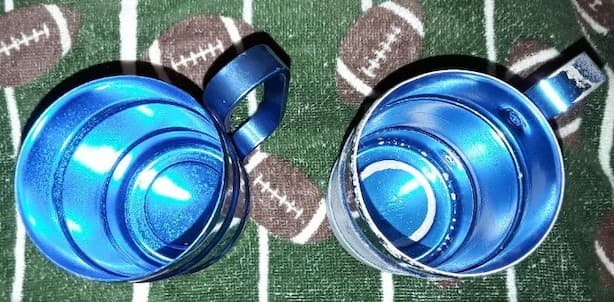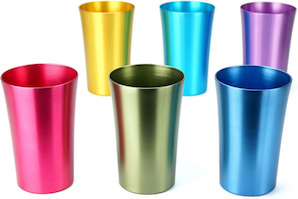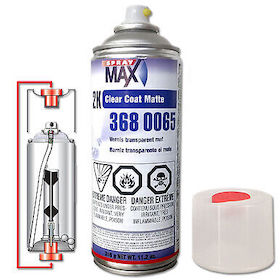
Curated with aloha by
Ted Mooney, P.E. RET

The authoritative public forum
for Metal Finishing 1989-2025

-----
Does anodized or coated aluminum have FDA approval
Q. When placed in dishwasher our Emsonware mugs become ugly ... the paint/color on the outside vanishes, yet the color on the inside remains.


Usually when they become very bad we toss and replace, but since these mugs are from the 60's they are becoming more difficult to find. We love these mugs and if there is anyway to prevent or restore we would love the info. Thank you
Elizabeth Corson
- Haddonfield New Jersey
November 27, 2022
A. Hi Elizabeth. The sad answer is that anodized aluminum in not dishwasher safe. The reason is that dishwasher detergent (unlike the stuff you use for hand washing) is highly alkaline, and the alkalinity will attack both raw aluminum and anodized aluminum. It is vaguely possible that with careful shopping you could find a dishwasher detergent that is not quite so alkaline ... but then it probably wouldn't work as well either.
I think the outsides just get more exposure to the detergent and spray than the insides. You could try a clearcoat on the outside like Protectaclear from Everbrite [a finishing.com supporting advertiser] if you wish, but I think it would be better to just resign yourself to hand washing the Emsonware if it's starting to feel precious.
Luck & Regards,

Ted Mooney, P.E. RET
Striving to live Aloha
finishing.com - Pine Beach, New Jersey
⇩ Related postings, oldest first ⇩
Q. Greetings,
We are a distributor of pharmaceutical production machinery and manufacturer of support equipment of same.
Since finished aluminum is used extensively in our machines and those of our competitors we have taken FDA approval for granted.
More recently our customers have been asking for documentation pertaining to FDA approval of our finished aluminum parts for direct and incidental product contact.
We have 2 companies that finish our aluminum parts in standard clear, hard coat and teflon hard coat.
Sadly neither one of our suppliers can shed any light on the subject.
Our customer is willing at their expense to have all parts remanufactured and refinished if necessary for this assurance and we are willing to switch finishers. Hopefully one of you are in our area. Any quick response would be greatly appreciated.
Don S [last name deleted for privacy by Editor]- N. Huntingdon, Pennsylvania, USA
2001
A. I have done a fair amount of research into this topic. You would think that with all the anodize and hardcoat used in cookware, food processing equipment, and medical equipment that the FDA issues would be well settled. According to my research, they are not. I contacted industry organizations and large manufacturers of these items. No one could document any sort of FDA approval for anodizing. So I contacted the FDA ... it is a long story. Stay tuned for Chapter 2.
Chris Jurey, Past-President IHAA
Luke Engineering & Mfg. Co. Inc.
![]()
Wadsworth, Ohio

A. I bounced around FDA, talked to various people, and visited a number of their websites. The most helpful was vm.cfsan.fda.gov/ I was not able to get a completely clear understanding of what FDA approval means. Of course, I am not an attorney, so do not depend on anything I say. This is my layman's interpretation of the FDA requirements.
Getting something FDA approved takes a lot of time, a lot of money, and a lot of testing to prove a product's safety. Or an exemption can be obtained from the FDA if one can prove that the food contact product is not added to the food above a very low threshold level. This can also take a lot of time, money, and testing. These approvals or exemptions are very product specific. (i.e., Product Number 123 from Company XYZ)
Another exemption is available, but it is not "approved" by the FDA. That is, it is up to the company to demonstrate that their product meets the conditions for exemption without FDA review. This type of product would be FDA "compliant" and the FDA would only ask for the documentation if a significant health problem were discovered. I think the majority of products, including anodize, would fall under this category. It appears that many companies have not developed the necessary data but absent a health threat, the FDA is not asking. So, no problem. Chapter 3 ... conditions for exemption.
Chris Jurey, Past-President IHAA
Luke Engineering & Mfg. Co. Inc.
![]()
Wadsworth, Ohio

A. There are two methods to be exempt from FDA regulation.
The first is called "Prior Sanction". To claim this exemption, you must be able to show that a substance was commonly used in food prior to January 1, 1958 and was generally recognized as safe. I suspect anodize and hardcoat meets this requirement but I cannot site any specific data or documentation. I would like to see any anyone has on this.
The second method is called GRAS or Generally Recognized As Safe. Each company is responsible to demonstrate that their products meet this requirement. The FDA has published several lists of GRAS substances. Inclusion on these lists is not the same as an approval but would tend to support your claims of GRAS. Most of these lists were developed a long time ago. It is almost impossible to add new substances as the requirements are similar to receiving an actual FDA approval. I could not find specific reference to anodize on these lists. However, things like Alumina, Aluminum Oxide, and Aluminum Hydroxide are listed. Occasionally, the FDA would issue an informal non-binding opinion letter. There is one dated October 18, 1963 which states "We see no food additive problem involving an anodize oxide surface ..." But it is referring to a specific company's anodized product.
I think a good case can be made that anodize and hardcoat meet the GRAS standard for exemption. But I hope I never have to prove it.
Chris Jurey, Past-President IHAALuke Engineering & Mfg. Co. Inc.
Wadsworth, Ohio

A. Chris was very precise and informative.
I'd just like to state that what he said was accurate. In the past I did a very substantial amount of work for the disposable medical parts industry (oxygen regulators to be exact) and they were looking into anodizing them with color to differentiate not only the product but as a "spice up" to the thing. Something to do with a study saying how color improves your health and so on and so forth. Basically the dyes for anodizing are not FDA approved and nothing could be done on that front to approve them. But the anodizing itself is generally accepted as being safe and harmless when properly done. People would breath oxygen through these units, so they had to be safe. In a 5-6 year period of time with working with them and doing some countless # of parts I never once had any issues arise from my work. So apparently, time tested truth is the only way to say that it is safe and I just wanted to lend that to the discussion.
Matthew Stiltner
plating company - Toledo, Ohio
Q. Don S,
May I ask why your customers have asked for coatings on your aluminum parts? I.E., is the reason a perception issue or a health/safety issue?
We have held that bare aluminum is generally accepted as safe for packaging manufacturing equipment parts. The follow up posts from Mr. Jurey make sense regarding the coatings, but do not address the premise of the question: that bare aluminum is not FDA compliant. Is it?
packaging material manufacturer - Telford, Pennsylvania
2005
Q. Please inform me if there are any updates for and FDA approvals on anodizing.
Dan Patelplating shop - Paterson, New Jersey, USA
2005
Multiple threads merged: please forgive chronology errors and repetition 🙂
Looking for a non-toxic coating for aluminum
I am a MET student in Indianapolis Indiana. Our class is molding aluminum muggs. We are not sure what kind of coating to use on the finished product. The current final finish is applied by a nylon wheel. We are looking for a coating that can be easily applied and allow the cup to be used. We have a few ideas, but not sure if they would work.(acrylic, some type of clear coat, etc.) Any information would be greatly appreciated.
Josh ArmeyStudent - Indianapolis, Indiana
2005
|
|
A. The aluminum itself should be fine, but if your worried about it corroding or discoloring you can always anodize it. Just make sure that you seal it in hot water, not nickel acetate. If you have a clear anodize sealed in hot water it is okay for food use. If you want to go REALLY low-tech on it, and you don't have too many pieces to do, you could always just boil it in distilled water for 24 hours - Wernick Pinner and Sheasby say that doing that will put a thin but highly protective coating on the aluminum. Good luck, Jim GorsichCompton, California, USA A. If you plan on using these mugs for drinking, thin coat of sulfuric anodizing should suffice. Just seal in DI water.  Marc Green anodizer - Boise, Idaho |
Q. I'm not sure how I ended up at this site, however, I am a food caterer and want to know if anodized cookware is SAFE?
Donna Jill Boyett- Okmulgee, Oklahoma
2007
A. What would make you think it's not, Donna, or at least less safe than other cookware? Dozens of brands of it are in every store in the country. Haven't you also seen people cooking in aluminum pots & pans from your very earliest memories? And haven't hundreds of millions of people been using anodized cookware around the world since before you were born?
See topic 19624 for a copy of an old reply from the FDA on the subject. See thread 8962 which contains excerpts from a position paper by the Alzheimer's Association.
But if you do large studies you'll find that the absolute safety of everything remains forever in question because there theoretically can always be a bigger study which will find some relationship. For example, what do you think of the safety of coffee or red wine or mammograms? There is perpetually a new study where each of these marginally reduces the danger of you getting X but marginally increases the danger of you getting Y, and it may always be thus. And no matter what it is, there will always be some people who feel it's not safe. But most people feel anodized aluminum is safe to the extent that anything is "safe".
Luck and Regards,

Ted Mooney, P.E.
Striving to live Aloha
finishing.com - Pine Beach, New Jersey
Q. As yet, I have not seen definitive data regarding the safety of anodizing as it relates to cookware. While I am willing to accept that aluminum oxide (the anodize layer) is probably stable and safe, I have not seen any information regarding dyes, and particularly nickel acetate, the sealer which locks the dyes into the pores of the anodize layer. Do the sealer and dyes remain stable under boiling and frying conditions?
John Best- State College, Pennsylvania, USA
2007
A. Hello, John. I don't believe there is any dye involved in anodized cookware. The dark grey or charcoal color of hard anodized cookware is a natural result of the anodizing process rather than a dye; it is due to silicon, copper, and other alloying materials. Although I can't speak for the internal operations at any given cookware manufacturer, I think hot water sealing would be done. Thanks for your input.

Ted Mooney, P.E.
Striving to live Aloha
finishing.com - Pine Beach, New Jersey
Q. Why do you think nickel acetate seal is not acceptable for cookware? Aren't many hot water seals also including nickel acetate? We want an anodizing that is less expensive than hardcoat. After extensive testing clear anodizing is doing well, but it is sealed. My anodizer says unsealed would be nearly sticky? Aren't many hard anodized cookware products sealed as well? Your forum pops consistently as I seek answers. Great job and thank you.
Follow-up- ALSO very curious about RAW aluminum being FDA compliant- it may not be as abrasive resistant and stain resistant as hardcoat or clear anodize, but isn't it all alumina oxide in the end?
Brad
- Cartersville, Georgia
September 10, 2008
A. Hi, Brad. I'm just a generalist in metal finishing, without inside info on what cookware manufacturers do. I would have guessed that they use hot water or steam sealing to avoid any possibility of soluble nickel being found in their cookware, but a mini lit search reveals that some use steam but some use nickel acetate.
I don't know for sure if raw aluminum is FDA compliant, but I do know that it's not very satisfactory :-) I recently bought a Bialetti capucino percolator, the inside of which is raw aluminum, and it gets very dicey looking corrosion if not immediately washed and carefully dried.
Regards,

Ted Mooney, P.E.
Striving to live Aloha
finishing.com - Pine Beach, New Jersey
Q. What is an acceptable coating for aluminum components that will be in a pharmaceutical lab environment? We are considering teflon hard coat anodizing but we are not sure if it is allowed. Based on the first few threads, coated aluminum might be ok. We can't have any particulate or corrosion. Thank you in advance for any advice.
Richard Spencer- Exton, Pennsylvania, USA
June 13, 2012
A. Hello, many years ago we used a product called Alodine (if my memory serves me correct) and not sure of the exact product number/ID - they made one that turned the aluminium slightly yellow/gold - the other clear - it was touted as 'chemical anodising' - we used/experimented with it on all sorts of stuff on aircraft - motorcycles - and to stop methanol attacking aluminium - I've even heard of it used inside an aluminium fuel tank on a race boat. But - be careful as it's certainly not a 'safe for use in the kitchen' type product. I assume once the process is finished and the surface rinsed - it's safe, but I'm sure the maker can assist you with the answers.
William John- Melbourne. Australia
A. Hi Richard & William.
Alodine is a Henkel trade name long used for chromate conversion chemicals for aluminum. Traditionally most of these would be hexavalent chromium and quite unsuitable for food services. There are some trivalent chromium Alodine formulations, but I doubt that even these are appropriate for food surfaces.
Regards,

Ted Mooney, P.E.
Striving to live Aloha
finishing.com - Pine Beach, New Jersey
Q. Are food dishes with colored anodized coating permitted if they are for serving only and not for cooking?
Assaf Binyamindesign studio - Modi'in, Israel
October 22, 2012
A. Hi Assaf. This would be a matter of regulatory rulings in the various countries, but to my knowledge a clear and understandable ruling has never been given in the USA. When I was a child, colored anodized drink tumblers were common, and they are back as a "retro" item. I doubt that anything changed, except the fact that most people put their 'glassware' into automatic dishwashers these days, which would ruin anodized aluminum.
Obviously I can't swear to the accuracy of my own assumptions, but I've never heard of follow up rulings despite running this website where the question has been repeatedly asked for 17 years, and where the questions read by tens of thousands if not hundreds of thousands of people, and where no updates have been offered.
I don't think the FDA does much actual investigation of this kind of thing anymore and doubt that you'd actually run into regulatory problems today. But we're moving into REACH requirements in Europe that may effectively eliminate the use of colored anodizing eventually. Further, a dishwasher will probably ruin the product the first time it's used, and I don't know if you'd be able to prevent that. Good luck.
Regards,

Ted Mooney, P.E.
Striving to live Aloha
finishing.com - Pine Beach, New Jersey
A. This string of entries started with a question on pharmaceutical equipment, and then diverged to hard coat frying pans and color anodized aluminum tumblers. The FDA does not approve materials that are used for pharmaceutical machinery and they do not have a registry of approved manufacturers who make them. There is a list of non-binding Current Good Manufacturing Practices (CGMPs), however firms are afforded the flexibility to select equipment that best satisfies their particular needs and that is capable of meeting the relevant CGMP requirements.
The FDA is responsible for approving food additives and color additives, including Food Contact Substances (FCS) that may migrate to food due to contact. They define an FCS as "any substance that is intended for use as a component of materials used in manufacturing, packing, packaging, transporting, or holding food" I'm not sure if this definition includes household items like frying pans and tumblers particularly since I couldn't find any premarket approvals for such items. You can find many such items certified by the National Sanitation Foundation (www.nsf.org). There are several varieties of hard coat frying pans and items made with color anodized aluminum certified to "Food Equipment" or "Food Equipment Material" ANSI standards. NSF certified products receive guaranteed regulatory acceptance in N. America.
- High Point, North Carolina, USA
October 17, 2014
![]() Very helpful posting, Mark! Thanks :-)
Very helpful posting, Mark! Thanks :-)

Ted Mooney, P.E.
Striving to live Aloha
finishing.com - Pine Beach, New Jersey
Food safe coating for cast aluminum
-- this entry appended to this thread by editor in lieu of spawning a duplicative threadQ. I am interested in finding a coating for a knife with a cast aluminum handle and a stainless steel blade. I am looking to protect the handle from corrosion caused by washing in a dishwasher. Anodizing is not an option because of the stainless steel blade. Please respond with any options you may know of. Thanks!
Maggie M [last name deleted for privacy by Editor]- Waverly, Iowa
February 9, 2017
A. Hi Maggie. Anodizing isn't dishwasher-safe anyway. You can use a simple one-component clearcoat like Everbrite [a finishing.com supporting advertiser], or a two-component automotive clearcoat. In either case, scrub it with powdered pumice
⇦ this on
eBay or
Amazon [affil links] dissolved in water and a toothbrush first to make sure it's really clean.
Luck & Regards,

Ted Mooney, P.E. RET
Striving to live Aloha
finishing.com - Pine Beach, New Jersey
Q, A, or Comment on THIS thread -or- Start a NEW Thread


